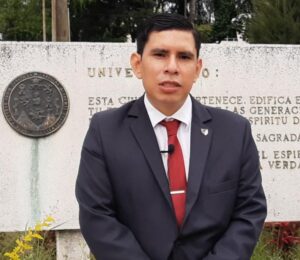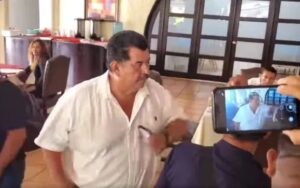Guatemalan President Bernardo Arévalo celebrated 100 days in office on April 23. While journalists see improvements in how the presidency is treating the press compared to the previous governments, data show that threats, violence and criminalization against the profession – many coming from other actors of the State – have not ceased.
During the first quarter of 2024, the Observatory of Journalists of Guatemala recorded 22 attacks and restrictions on the press, three of which occurred between Jan. 1 and 14 during the last two weeks of Alejandro Giammattei's government; The remaining 19 attacks were recorded after Jan. 14 when Arévalo had taken office.
Although there has been a small improvement compared to the same period last year, organizations and journalists remain concerned about the criminalization of the profession in Guatemala.
“From the Presidency of the Republic there is openness towards journalists, officials are more diligent when it comes to interviews and requests for information, restrictions on filming or recording inside the palace have ceased and there are no publicly known cases of restrictions on information or discretion when it comes to invitations to meetings or activities of the president and the vice president, as happened in the last eight years, with Giammattei and Morales,” the Observatory said in a press release.
“However, this was not recorded in other state institutions that continue to exercise limitations on journalistic work or criminalize journalists,” it added.
The attacks against journalists, according to the observatory, come mainly from the Attorney General, the Judicial Branch and members of Congress. The observatory also said that many of the attacks on journalists are carried out through social networks by netcenters [groups of people paid to fulfill a specific objective, for example, disinformation].
Judicial persecution
During the first days of his mandate, Arévalo, in a meeting with journalistic organizations, said that his government was not going to use tools to judicially persecute the press and that freedom of expression was one of his priorities.
Even so, journalist and owner of elPeriódico, José Rubén Zamora, remains in prison even though his conviction for money laundering was overturned and many international organizations have pointed to violations in his case. He faces other controversial charges, yet has experienced multiple delays in hearing dates.
There is also the case of Engelberth Blanco, a journalist who wrote for La Hora, who is waiting for a court to decide whether to link him to criminal proceedings or dismiss the accusations against him.
For the Observatory, the Supreme Court of Justice and the Judicial Branch in Guatemala are not only an active part of the criminalization of journalists, but also maintain restrictions on media being able to cover certain hearings, “particularly cases of criminalization of human rights defenders and trials of people linked to acts of corruption.”
According to the observatory, there are reports of journalists being left outside the courts, being prevented from reporting, and of prosecutors taking photos of journalists to later use them in smear campaigns or to issue threats through false profiles on social networks.
In an event marking the first 100 days of his government, Arévalo criticized the system of administration of justice in his country.
“Today, some of these actors, such as the public prosecutor's office of [Attorney General María] Consuelo Porras, use their position to intimidate their critics and to attack and try to weaken, from their trench of impunity, the project that the people of Guatemala have chosen for their future. We will not rest until we achieve, through legal means, the removal of this threat to democracy,” Arévalo said.
Members of the legislature have also been protagonists of assaults on journalists.

Héctor Coloj, coordinator of the Observatory of Journalists, said that there are signs that there will be a good relationship between the Arévalo presidency and the press but they remain alert. (Photo: Courtesy)
On April 27, Deputy Oswaldo Rosales Polanco, from Partido Vamos, was aggressive toward two journalists who recorded him while he was trying to enter a meeting that President Arévalo was holding with mayors of Quetzaltenango, a city in western Guatemala.
The reporters were Abel Reyna, from Revista Coyuntura, and Roderico Valdez, from a local television news program.
“When Rosales Polanco realized that photographs and video had been taken of him…he lunged at Valdez and grabbed him by the neck and twisted his arm. Subsequently, he went on top of Reyna, with whom he exchanged a series of words, he snatched the cell phone he had in his hand and tried to touch his face," the Association of Journalists of Guatemala denounced in a statement.
The latter part of this reported interaction can be seen in a video posted to social media. Neither the presidency nor representatives of the legislative branch have commented on the matter, as reported by Prensa Libre.
Héctor Coloj, coordinator of the Observatory of Journalists, told LatAm Journalism Review (LJR) that there are signs that there will be a good relationship between the Arévalo presidency and the press but they remain alert because in “the last government, unfortunately, there were many patterns of attacks or restrictions began in the Executive and quickly escalated to other agencies both at the state level and in local or municipal governments. These events became normal,” Coloj said.
Patterns of limiting reporting and of attacks
The Observatory has not only recorded violence against journalism coming from actors linked to positions of power within the State, but also from organized groups such as unions, community authorities, political groups or individuals who consider the work of the press to be a risk or hindrance to their interests.
At least five cases so far this year have been reported of journalists being attacked while covering demonstrations or news events, according to data from the observatory. Journalists are attacked and accused of “dividing the country,” of being “traitors,” “selling the homeland” and belonging to “left-wing media.”
These attacks also occur through social networks, according to the observatory. At the same time, there is a recurring pattern of limiting or attacking journalists during coverage of raids, arrests or crime coverage.

Deputy Oswaldo Rosales Polanco was aggressive toward two journalists who recorded him while he was trying to enter a meeting that President Arévalo was holding. (Photo: Video screenshot)
For example, José Cotzajay, cameraman for Albavisión, said he was prevented from covering the murder of a young man on March 21 due to the refusal of a group of neighbors. Cotzajay was asked to leave the scene and was unable to film anything. The cameraman reported the incident through a broadcast on TikTok, which is no longer available.
Cotzajay, who covers incidents of violence nationwide, told LJR that this was not an isolated incident.
“This has happened to me on several occasions, both by groups of people from the places [neighbors in the area] and also by criminal groups or the National Civil Police,” he said.
However, in reporting that involves the executive, he believes that there is a big difference between this government and the previous one.
Guatemalan journalists and media are fighting to reduce the criminalization and constant punishment to which they have been subjected for years. Many in exile continue working for press freedom in the country.
The Observatory has urged President Arévalo, in commemoration of his 100 days in power, to “avoid any narrative against the professional and supervisory work of the media and journalists,” the Observatory team said in a press release.
“It is also important that if any government official, at any level, pressures or acts in a way that threatens the safety and work of communicators, they issue the corresponding sanctions to prevent these acts from being replicated.”